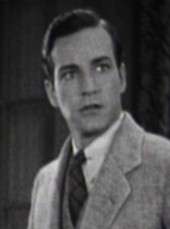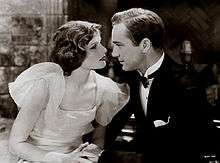David Manners
| David Manners | |
|---|---|
 as John Harker in Dracula (1931). | |
| Born |
Rauff de Ryther Duan Acklom April 30, 1900 Halifax, Nova Scotia, Canada |
| Died |
December 23, 1998 (aged 98) Santa Barbara, California, United States |
| Occupation | Actor, Singer |
| Years active | 1924–1953 |
| Spouse(s) | Suzanne Bushnell (1929-1931; divorced) |
| Partner(s) | Bill Mercer (1948-1978; Mercer's death) |
David Joseph Manners (April 30, 1900 – December 23, 1998) was a Canadian-American actor.
Early life
Manners was born Rauff de Ryther Duan Acklom in Halifax, Nova Scotia, the son of British parents, Lilian (Manners) and writer George Moreby Acklom, and the nephew of military figure Cecil Ryther Acklom.[1] Manners originally studied forestry at the University of Toronto, but he found it boring. Over his father's objections, he pursued a stage career and appeared in both Broadway and out-of-town productions. He came to Hollywood at the beginning of the talking films revolution after studying acting with Eva Le Gallienne, even though she had remarked that he was "a very bad actor" after seeing one of his stage performances. He once appeared on stage with Helen Hayes. His family moved to New York City in 1907, and to Hastings-on-Hudson, New York in 1922.
Hollywood career
Manners was serendipitously "discovered" by the film director James Whale at a Hollywood party, and within a few years, he was a popular leading man, playing opposite such actresses as Katharine Hepburn, Barbara Stanwyck, Gloria Stuart, Myrna Loy, Loretta Young, and Ann Dvorak. He was paired several times with Helen Chandler. His first film, directed by Whale, was destroyed before having been released , but with his second movie, Journey's End (1930), The New York Times and Variety officially bestowed their imprimatur upon the fledgling film actor. His subsequent film appearances in movies made at RKO Radio Pictures and Warner Brothers were critically praised (again including The New York Times, an early and prescient adherent of his acting abilities), and he was contracted by the latter studio.
In late 1930, he filmed his best remembered role, as Jonathan Harker opposite Bela Lugosi, in Universal's horror classic, Dracula (1931). Until the end of his life, Manners continued to receive fan mail from fans of the movie, although he claimed to have never seen the finished film. In his tenth movie, he co-starred with Barbara Stanwyck in Frank Capra's critically acclaimed but commercially unsuccessful The Miracle Woman (1931). The New York Times, again lauding Manners, featured this tribute, "Manners does exceptionally well with this sympathetic assignment".
During his brief tenure at Warners, which loaned him to other studios quite frequently, Manners progressed from callow featured actor and leading man to finally attaining star stature with the lead in Crooner (1932). Shortly thereafter, he began to freelance with much success. One of the final films he made before the termination of his Warner Bros. contract, was RKO's A Bill of Divorcement, starring John Barrymore and Billie Burke. Katharine Hepburn, who made her debut in the same film, once commented that "David was a big star. I was so nervous working with him ... He was... just a dear to work with and a totally professional and talented actor."

Lucille Ball, a dancer in Roman Scandals, commented, "David wasn't in the one scene I did in Roman Scandals, but he watched every scene shot. He was tremendously enthusiastic, and he...invited me to supper. ... He was mobbed everywhere. All the time he kept telling me I had style and personality. He said if I persevered I'd get somewhere in Hollywood. Not once did he ever hint that he'd like to take me home to his boudoir. ... He was so utterly charming." Many studios vied for his talent and services besides RKO and Warner Brothers, including Columbia, Universal, Paramount, Fox Film Corporation, Tiffany Pictures, and United Artists.
Pursuit of other interests
After the success of Dracula, Manners worked for several years as a romantic leading man, and was most often seen in a tuxedo in romantic comedies and light dramas. The Last Flight (1931), a Lost Generation celebration of the high life in Paris, and Karl Freund's The Mummy (1932) with Boris Karloff were two standouts. But by 1936 he had grown bored with Hollywood, and abandoned his film career. He reportedly never acclimated to Hollywood, which he found to be "a false place". Although he was among the first group of actors to join the fledgling Screen Actors Guild in 1933, he returned to New York City. In 1936, he returned to California, living on a ranch near Victorville until 1956, and later in Pacific Palisades and Santa Barbara, with his partner, writer Bill Mercer, for thirty years until Mercer's death in 1978.[2]
In 1940, he officially changed his name to David Joseph Manners (Manners was his mother's maiden name),[3] and became a naturalized citizen of the United States. He returned to the stage, working regularly until his retirement in the 1950s. Appearing on Broadway, in summer stock, and on tour, Manners was cast in a variety of productions, including the ill-fated Hidden Horizon (1946).
Manners spent the remainder of his life in private pursuits, such as painting and writing. Several of his novels, published by Dutton, sold over 100,000 copies each. His reflections on philosophy were put forth in Look Through: An Evidence of Self Discovery, published in 1971 by El Cariso Publications.[4]
Death
Manners died in Santa Barbara, California on December 23, 1998 at age 98, having outlived his long-term partner, Bill Mercer, who had died twenty years earlier. He was cremated and his ashes were scattered at Rancho Yucca Loma.
Filmography
|
|
Bibliography
- Clive Hirschhorn. The Warner Bros. Story (New York: Crown Publishers, New York, 1979); ISBN 0-7064-0797-0
- Ephraim Katz. The Film Encyclopedia (New York: Harper Perennial, 1980); ISBN 0-06-074214-3
- David Morgan Jones. The Wonder Within You, Trafford Publishing (2006); ISBN 1-4120-5013-8
- McMurchy, D. (July 1999), "David Manners: A Perfect Gentleman", Classic Images, Muscatine, Iowa, 289
References
- ↑ "David Manners Biography".
- ↑ David Morgan Jones. The Wonder Within You (Trafford Publishing, 2006); ISBN 1-4120-5013-8; ISBN 978-1412050135
- ↑ Manners was the actor's mother's maiden name, moviediva.com (cached version); accessed October 16, 2014.
- ↑ "David Manners Biography" Retrieved June 3, 2015
External links
| Wikimedia Commons has media related to David Manners. |
- David Manners at Find a Grave
- David Manners at the Internet Movie Database
- David Manners at the Internet Broadway Database

- David Manners homepage
- David Manners 1997 interview, accessed October 1, 2007